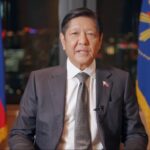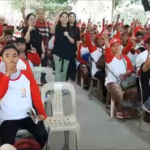Filipinos persist in an echo chamber characterized by utopian rather than dystopian social thinking, a cultural norm uniquely described as “resilient.”
Despite the Philippines being ranked 76th in this year’s World Happiness Report and facing challenges like geopolitical tensions, natural disasters, confidential funds, and controversial social-economic support, six out of 10 Filipinos believe in a positive 2024.
Results from the Pahayag End of the Year (P-EOY2023) survey by PUBLiCUS Asia Inc., conducted between November 29 and December 4, reveal that positive outlooks are grounded in personal experiences.
Favorable opinions about the nation’s status going into 2024 rose from 59 percent to 68 percent, with negative opinions decreasing from 41 percent to 32 percent.
Of the social class pyramid, however, lower-income households (18 percent) and non-working individuals (17 percent) express more uncertainty or are undecided.
Pahayag survey
In the recent P-EOY2023 survey, Filipinos’ positive outlook is rooted in their experiences.
Notably, there are positive shifts in opinions about the current state, national direction, and economic prospects.
Overall, there’s a noticeable increase in favorable opinions about the nation’s status going into 2024, rising from 59 percent to 68 percent.
Negative opinions have decreased from 41 percent to 32 percent.
Compared to the previous survey, the country has seen a slight improvement from 43 percent to 45 percent. Notable increases are observed in North Luzon (43 percent to 49 percent), South Luzon (40 percent to 45 percent), and Visayas (41 percent to 47 percent).
However, Mindanao exhibits a sharp fall from 50 percent to 44 percent. Certain age and income categories show variations, with 18–24-year-olds increasing from 35 percent to 47 percent, while 25–29-year-olds decrease from 52 percent to 43 percent. Middle-class voters also decline in Q4 from 48 percent to 38 percent.
Perspectives on the country’s direction notably recovered, surging from 61 percent in Q3 to 66 percent in Q4. Positive trends are observed in North-Central Luzon (60 percent to 64 percent), South Luzon (54 percent to 62 percent), and Visayas (57 percent to 65 percent).
Mindanao sees a slight decline from 70 percent to 67 percent for the second time.
Positive changes in age and income groups are notable, with 18-24-year-olds increasing from 50 percent to 63 percent, 30-39-year-olds from 66 percent to 71 percent, and middle-income voters from 58 percent to 68 percent in Q4.
The data suggests that Filipinos across social strata expect comprehensive national economic prospects for the next year, surging from 57 percent in Q3 to 67 percent in Q4.
Meanwhile, household financial prospects for the next quarter also exhibit a positive trajectory, increasing from 62 percent in Q3 to 70 percent in Q4.
Pulse Asia survey
In a survey conducted by Pulse Asia from December 3 to 7, 92 percent of Filipinos expressed optimism for the upcoming year.
Only 1 percent indicated facing 2024 without hope, while 7 percent were undecided or neutral about their outlook for the coming year.
“Amidst the various challenges Filipinos face daily, most of them continue to remain optimistic, with 92 percent saying they will face the new year with hope. This is the prevailing sentiment in every geographic area and socio-economic grouping,” Pulse Asia said in its data.
The survey sampled 1,200 representative individuals aged 18 years or older, providing a comprehensive perspective in this nationwide poll.
Davaoenos outlook
SunStar Davao delved into the outlook on hope through interviews with two full-time employees who share similar perspectives.
Both emphasized that hope should not be romanticized and that the quality of life is a collective effort between individuals, the government, and society, rooted in overcoming struggles.
In a virtual interview, 26-year-old postgraduate literature student and virtual assistant, Eden Mae Aguanta, expresses optimism for the next few years. She clarifies that optimism doesn’t equate to expecting only positive outcomes.
“Naga-depende man gud ang butang sa atoa. Subjective ang tanan and we see things differently. If you see things positively in the next years to come then siguro, you are living in a good condition right now. If gusto kag nindot nga kinabuhi, apilan natog paningkamot but I doubt if we can achieve that without social support from the state (Things depend on us. Everything is subjective, and we see things differently. If you see things positively in the next years to come then surely, you are living in a good condition right now. If you want a good life, then exert an effort, but I doubt if we can achieve that without social support from the state” she added.
Noriza Mabanding, a medical student and virtual assistant in a US Medical Health Service, shares her hopeful perspective.
She challenges the notion that hope implies ignoring societal issues, emphasizing the practice of positivity and acknowledging her experience at the bottom of the social ladder.
“It is a reverse elitism if we think there is no problem in our society right now. If I say I am hopeful does not mean I am being self-centered. Therefore, I do not represent those people who are hopeful because they have always been at the top of the food chain,” she said.
Despite the Philippines being labeled a “less developed” or “third world” country, grappling with widespread poverty and over 27.6 million people living below the poverty line, Filipinos consistently approach each new year with positivity.
In the Filipino sociological context, hope translates to “fortitude,” ingrained in their culture and faith. This unique cultural perspective allows them to bloom even in times of crisis and social challenges. DEF



